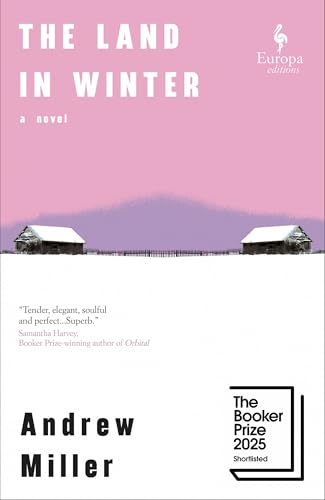Discussion Guide
The Land in Winter
These book club questions are from the Booker Prizes, for which this novel was on the shortlist in 2025. A full reading guide can be found here.
Book club questions for The Land in Winter by Andrew Miller
Use these discussion questions to guide your next book club meeting.
The novel is split into three parts, and the action unfolds over a couple of months. In an interview, Andrew Miller said The Land in Winter was an attempt ‘to make a certain kind of novel – lots of flow and momentum, and full of narrative pleasures’. Do you think he has achieved this? What did you think of the novel’s structure and pace?
Miller was born in Bristol in 1960 and has said the book was inspired by a ‘wish to reach back to a period that was right at the furthest stretch of what I could in any way claim to remember’. The novel is full of objects, clothes, brands and behaviours that feel specific to England in the early sixties. Did you enjoy the 1960s setting? What surprised you most about what life was like during that era?
Aside from the first chapter, the novel alternates between the interior lives of the four main characters: Eric, Irene, Bill and Rita. They are all recently married, about to have their first children, but they are also very different, with varied backgrounds and preoccupations. Each of them faces a distinct and dramatic moment of reckoning. Who did you most like spending time with and why? Were you surprised by the turn of events?
Huge social changes were just around the corner, but the women’s lives right now feel constrained and restricted. Both Irene and Rita spend a lot of time stuck at home, waiting. What did you think of the friendship struck up between the two women? What does their outing to Bristol reveal about their domestic situations?
The men are often preoccupied by their work and their fathers. Do you think either Bill or Eric actually enjoy their jobs? What did you make of Bill’s trip to London to see his family?
The Second World War, including the horrors of the Holocaust, loom in the background of the novel, although they’re rarely discussed out loud. Meanwhile several characters in the novel struggle with their mental health. What did you think of the way people’s internal troubles were represented? How does the novel expose the things that are left unsaid?
Irene throws a house party on Boxing Day, and her planning is described in meticulous detail. The party takes place at the end of part one, in the middle of the novel. It’s a set-piece moment when Andrew Miller brings his characters together in one place. What did you think of the party scene, the atmosphere Miller evokes, and where it is positioned in the book?
Alison Riley is one of the party guests, along with her husband Frank. Eric, who thinks he might be in love with Alison, believes she’s ‘the kind of person who might choose to bring the house down simply to find out what kind of noise it made’. What did you make of Alison as a character? Do you think she is portrayed fairly in the novel?
The Booker Prize 2025 judges said in their comments about The Land in Winter, ‘It’s 1962, and the most dramatic winter in living memory drops on rural England, leaving a group of brilliantly crafted characters trapped inside the weather, coping – and not coping – with the cold and the snow and one another.’ What did you think of the way Miller writes about the weather and how it shapes the course of events? Would things have turned out differently if it had been an ordinary kind of winter?
The first and final chapters of The Land in Winter stand out. The first chapter, unlike all the others, is written from the perspective of a patient in the local asylum, whose full identity we only learn later on. The final chapter is short and surreal. What did you think of the novel’s beginning and end?
The Land in Winter Book Club Questions PDF
Click here for a printable PDF of the The Land in Winter discussion questions

